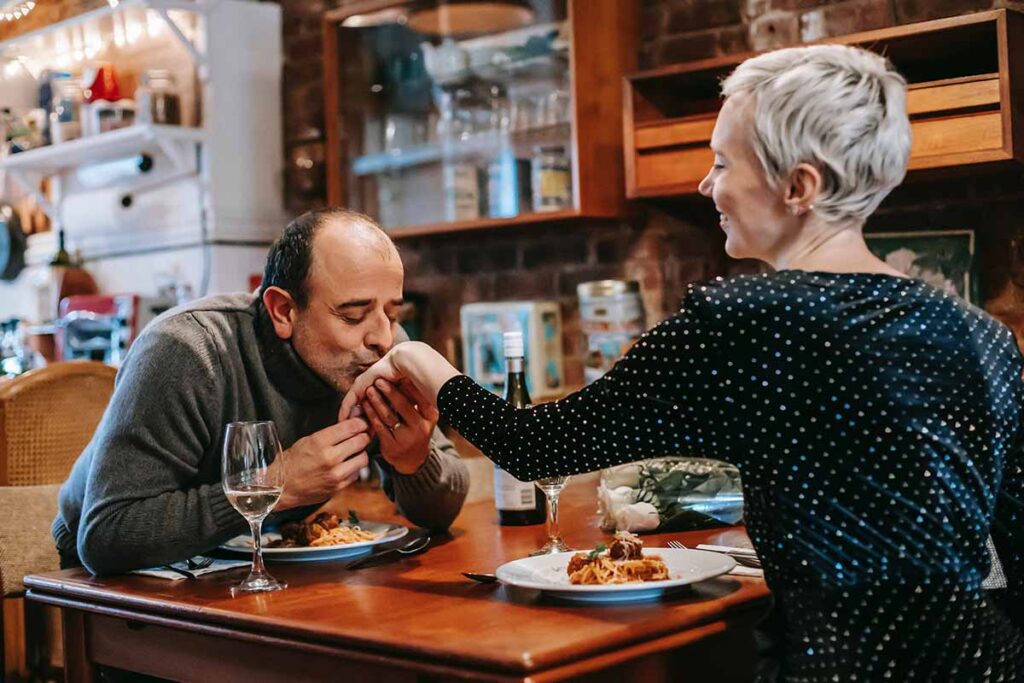
Types of Love
Different people and relationships can make us feel various types of love.
In reality, expressing affection towards a friend, family member, or romantic partner involves a range of feelings and experiences that are not easily captured by a single word.
Recognizing this complexity, the Greeks crafted eight distinct words to articulate the diverse types of love that color our lives.
Let’s explore each of these terms to better understand the intricate facets of love.
This exploration will help us identify the specific emotions we may be experiencing. However, before we start, let’s ask ourselves: What is love?
What is Love?

At its core, love is a strong affection that involves caring deeply for someone or something and finding great joy and interest in them.
It involves a strong emotional connection, often accompanied by feelings of warmth, compassion, and attachment.
Ultimately, love is a multifaceted concept that defies an easy definition like the one we have above.
It is indeed a complex and profound emotion that is difficult to define precisely, as it encompasses a wide range of experiences and meanings.
It is a journey of connection, understanding, and shared experience, continuously evolving throughout our lives.
Love can be felt and expressed in various ways, such as through acts of kindness, support, and selflessness. It can bring immense joy, happiness, and fulfillment to our lives while also making us vulnerable to pain and heartache.
Love can be both a feeling and a choice. It involves accepting and appreciating someone for who they are, including their strengths and imperfections.
Love often involves sacrifice, compromise, and the willingness to prioritize the well-being and happiness of the person or thing we love.
Ultimately, love is a deeply personal and subjective experience. It can vary in intensity, duration, and expression from person to person.
Love has been a topic of exploration in various fields, including psychology, philosophy, and literature, highlighting its profound impact on human life and relationships.
In addition to these perspectives, exploring various philosophical and artistic interpretations of love can offer further insights into its complexities and universal appeal.
Remember, there’s no single “correct” answer to what love is. It’s up to each individual to explore its meaning and find their own unique expression of this powerful force in our lives.
8 Types of Love
Love comes in different forms, like the love between siblings, the love within families, the love for God, and the love we have for ourselves.
In English and other languages, it can be hard to understand exactly what these words mean without looking at the situation and how they are used.
However, the ancient Greeks had a clever way of describing the different types of love that humans can experience.
They identified eight kinds of love, each with its own characteristics and implications.
Let’s explore what each of these words means and how you can recognize the type of love you might be experiencing.
Here is a brief summary of the eight types of love, according to the ancient Greeks:
- Agape
- Eros
- Ludus
- Mania
- Philautia
- Philia
- Pragma
- Storge
Agape
This is a type of love characterized by unconditional, selfless, and universal compassion.
It stems from a spiritual and altruistic perspective toward all living beings, embracing their flaws and differences.
Agape represents a noble and transcendent form of love capable of inspiring altruism, generosity, and sacrifice.
It can reflect the divine love that God has for humanity or the reciprocal love that humanity has for God.
Agape is the love you hold for every living thing without any conditions, where you intentionally give without expecting anything in return.

It becomes essentially agape when filled with compassion and care.
This type of love is also experienced when you genuinely desire the best for someone else without anticipating any reciprocation.
In essence, it’s an exceptionally pure and conscious form of love, often referred to as unconditional love.
Agape represents the most elevated form of love that one can offer.
Choosing to express Agape is a commitment to sharing love in all circumstances, even in challenging situations.
The driving force behind this type of love is the spirit. Our spirit encourages us to embrace a purpose greater than ourselves, motivating us to extend kindness to others.
Agape is basically universal love! We demonstrate this kind of love by expressing unwavering affection and care in every circumstance, regardless of the challenges or situations we may encounter.
READ Guide To Understand Agape Love to understand more.
Eros
This is the type of love that involves physical attraction, passion, and desire. Basically, it is the love associated with romantic relationships.
Eros is the type of love—that exciting and passionate feeling you have when you’re attracted to someone romantically.

It is named after the Greek god of love and fertility, who is also known as Cupid in Roman mythology.
Eros is a powerful and intense form of love that can be exhilarating but also dangerous, as it can lead to loss of control, obsession, or heartbreak.
Eros can be a catalyst for spiritual awakening when it is combined with other forms of love, such as agape or philia. It’s love that makes our hearts flutter.
The driving force behind this type of love is the physical body, which is controlled by hormones.
The surge of hormones within us ignites a passionate flame, craving romantic gestures from a cherished partner to fulfill its desires.
We express this type of love by engaging in physical affection, such as embracing in warm hugs or sharing tender kisses.
Ludus
This is the type of love that involves childlike playfulness, flirtatiousness, and casual interactions. Ludus is the love you feel when you’re having fun with your friends or engaging in playful flirtation.
It is based on a lighthearted, joyful, and fun-loving approach to relationships rather than serious or long-term commitments.
Ludus is a joyful and spontaneous form of love that can create excitement, laughter, and amusement. It can also involve teasing, seduction, or games.
Ludus is a form of love that is often observed during the initial phases of a relationship, often referred to as the honeymoon stage.

It encompasses teasing, lighthearted interactions, and shared laughter between two individuals.
While commonly experienced by young couples, older couples who actively cultivate this kind of love discover a more fulfilling and rewarding relationship.
The driving force behind this type of love is emotion (astral). Our emotions create a sense of exhilaration, enthusiasm, curiosity, and engagement when connecting with another individual.
We demonstrate this type of love by playfully expressing our romantic (flirtatious) interest in those we admire.
Mania
This is the type of love that involves obsessive, possessive, and jealous feelings. It is based on an irrational and excessive attachment to another person, often driven by insecurity or low self-esteem.
Usually, this type of love results in unwarranted jealousy or possessiveness, which is commonly referred to as codependency.
Obsessive love typically arises when there is an imbalance of affection between the individuals involved. The main contributing factor to Mania is an imbalance between Eros (romantic love) and Ludus (playful love).

By maintaining a healthy equilibrium of both playful and romantic love, the detrimental effects of obsessive love can be mitigated.
Mania is a destructive and unhealthy form of love that can cause anxiety, paranoia, or violence. Mania can also result from an imbalance or lack of other forms of love in one’s life.
The driving force behind this type of love is survival instinct. The instinct for survival compels an individual to develop a deep dependency on their partner as a means to establish their own sense of self-worth.
We can prevent falling into this kind of love by prioritizing self-care and personal growth rather than fixating solely on another individual.
Philautia
This is the type of love that involves self-esteem, Philia Types of Love – true friendship PIC800, self-respect, and self-care.
Basically, philautia is the love and care you have for yourself. Philautia represents a nourishing expression of love in which you acknowledge your intrinsic value and prioritize your personal needs.
It is based on a positive and healthy relationship with oneself rather than with others.
It’s about nurturing your own well-being, accepting yourself for who you are, and practicing self-care. Self-love starts with recognizing your role in taking care of your well-being.
Philautia is an essential and empowering form of love that can foster confidence, happiness, and well-being.

It can also enable one to love others more fully and authentically. It becomes difficult to embody and demonstrate love towards others if you haven’t first cultivated it within yourself, as you cannot give what you do not possess.
The driving force behind this type of love is the soul. Our soul enables us to introspect and focus on our essential needs, encompassing our physical, emotional, and mental well-being.
We demonstrate this type of love by respecting, honoring, accepting, valuing, and embracing ourselves for who we truly are.
Philia
This is the type of love that involves true friendship, loyalty, and mutual respect.
Philia is the warm feeling you have for your friends when you trust and enjoy spending time with them.
It’s a supportive and loyal kind of love based on a sense of equality and shared values between two or more people.
Philia is a virtuous and dispassionate form of love that does not depend on physical attraction or romantic feelings. Basically, it is experienced between friends or family members.
It emerges when both individuals share common values and hold mutual respect for one another.
Philia can foster a deep and lasting bond between friends, comrades, or partners who support each other through thick and thin.

This type of love is often referred to as “brotherly love,” or a deep bond between companions.
The driving force behind this type of love is the mind. Our minds discern which friends resonate with us on a similar frequency and whom we can trust.
It helps us evaluate and identify those individuals who share a common understanding and compatibility with us.
We demonstrate this form of love by openly sharing our beliefs and vulnerabilities with our close friends, fostering an environment of trust and acceptance.
Pragma
This is the type of love that involves long-term commitment, compromise, understanding, compatibility, and shared goals.
It is based on a rational and practical approach to relationships rather than emotional or passionate impulses.
Pragma is a distinctive and enduring form of love that evolves and deepens over the course of many years.
It’s the love that grows over time in committed relationships, where you work together as a team.
Pragma is a mature and realistic form of love that can endure challenges, changes, and difficulties over time.

Commitment and dedication are essential ingredients in cultivating Pragma.
It involves a lasting connection between a couple who actively choose to invest equal effort into their relationship.
This type of love can create a stable and harmonious partnership between two people who share common goals and interests.
Rather than simply “falling in love,” Pragma is akin to “standing in love,” consciously choosing the partner you desire to have by your side for an indefinite period.
The driving force behind this type of love is the subconscious (etheric). The subconscious compels partners to gravitate towards each other, evoking a sense of purpose and intentionality even without conscious awareness.
We demonstrate this form of love by investing effort and dedication into nurturing long-term relationships that are built on mutual reciprocity.
Storge
This is the type of love that involves familial affection, attachment, and protection.
Basically, storge is the love between family members, like the love you have for your parents, siblings, or grandparents.
It is an enduring love that thrives on acceptance and a profound emotional connection. This type of love arises effortlessly and instantly in the relationships between parents and children.
Storge is based on a special bond that comes from sharing a common history and caring for each other.
This is a natural and instinctive bond between parents and children, siblings, or other relatives.

It is also an innate love that finds its roots in the bonds of best friends. Storge can also extend to pets or other animals that are part of one’s family.
Storge is a gentle and nurturing form of love that can provide comfort, security, and support.
The driving force behind this type of love is memories (Causal). Our memories foster enduring connections with another person, contributing to the longevity of our bond.
With each new memory we create, the significance and value of our relationship grow.
We demonstrate this type of love by expressing gratitude towards the individuals who are close or dear to us.
Final Note
There we have it: eight different ways we can classify love, or the way we feel towards one another.
To understand love better, it’s helpful to have more words to describe it. This way, we can understand our own feelings and recognize when others are showing us love.
Generally, we usually focus a lot on romantic love, but the Greeks have taught us that there are many types of love.
So now we know that love is not limited to romantic relationships. It extends to familial love, the bond between parents and children, siblings, and extended family members.
Love also exists in friendships, where trust, loyalty, and emotional support form the foundation of the relationship.
Moreover, whether romantic, platonic, or familial, love enriches our lives and inspires us to be better versions of ourselves.
Above all, it’s important to avoid getting caught up in ‘Mania,’ which is an obsessive type of love that can lead to problems.
Instead of just focusing on ‘Eros,’ the romantic kind of love, it’s good to explore other types of love too.
Spend time with your friends and family to develop ‘Philia,’ a strong bond of friendship and care.
Don’t forget to have some fun and be playful with ‘Ludic’ activities every now and then.
If you’re looking for a lasting relationship, aim for ‘Pragma,’ which requires dedication and commitment.
Let your nurturing side shine with ‘Storge,’ the love between parents and children, or even by getting a furry friend like a dog.
Take care of yourself with ‘Philautia,’ which means loving and valuing yourself to avoid stress and sadness.
Finally, for those who are ready for a challenge, there’s ‘Agape,’ a selfless and unconditional love.







